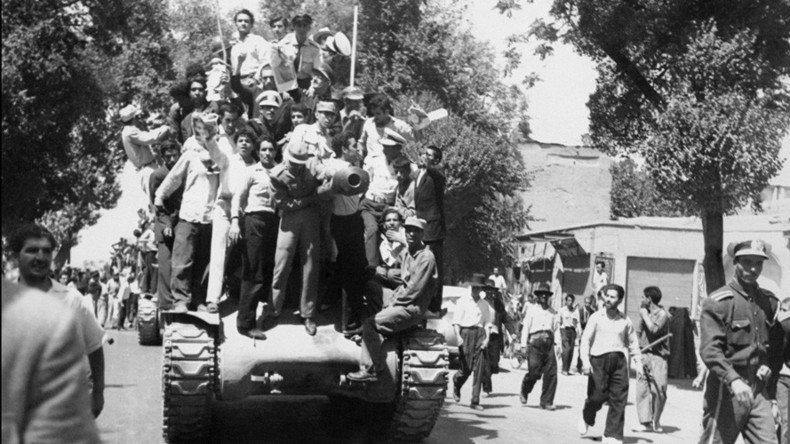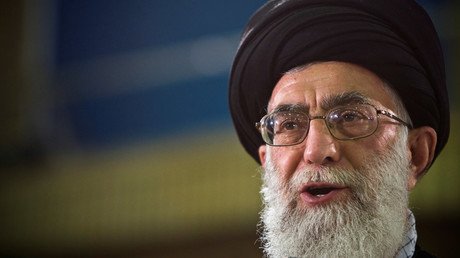Of the many crimes committed by Washington and its faithful British satrapy around the world, the coup that toppled the democratically-elected prime minister of Iran, Mohammad Mossadeq, in 1953 is among the most grievous.
The recent release of a tranche of declassified CIA documents, including memos covering the period, are a timely reminder not only of the staggering mendacity of both countries in asserting the right to lecture the world about democracy and human rights, but the extent to which they have wrought so much damage and devastation throughout their respective histories.
Operation Ajax, the name by which the sordid plan to undermine and topple Muhammad Mossadeq’s government is known, was undertaken in response to Mossadeq’s decision to nationalize Iran’s oil resources with a view to husbanding the revenue for the benefit of the Iranian people, rather than allow it to continue to be sucked out of the country by the then British state-owned Anglo-Iranian Oil Company (AIOC) - forerunner of today’s global oil conglomerate BP.
Britain had been in control of Iran’s oil since 1908 when the country was known as Persia. London set up AIOC specifically with the development and exploitation of this energy bonanza in mind. The UK government taking over a controlling share of the concession that had been granted to English mining entrepreneur William Knox D’Arcy by Persia’s monarchy in 1901. It came at a point when Britain’s large navy was shifting from coal to oil-powered engines, thus making a secure oil supply of critical strategic and military importance for a country whose empire covered almost a quarter of the planet’s land surface.
None other than Britain’s future prime minister Winston Churchill affirmed the importance of control over Persia’s oil, when he wrote, “Fortune brought us a prize from fairyland beyond our wildest dreams. Mastery itself was the prize of the venture.” Note here the colonial grandeur of Churchill’s sentiments - a turgid celebration of the opportunity for enrichment that was so unabashed it would make a low-rent mafia hood blush.
The record shows that throughout the AIOC’s presence and operations in Persia (the country became Iran in 1935), Tehran received a derisory percentage of the huge revenue garnered from the oil extracted from its territory. This triggered a rise in national consciousness over Iran’s independence and dignity vis-à-vis the colonial and imperialist powers, and lifted Mossadeq into the office of prime minister in 1951.
Soon after coming to power, he nationalized Iran’s oil and confiscated the assets of the AIOC. In a speech explaining his motives, Mossadeq said, “Our long years of negotiations with foreign countries...have yielded no results thus far. With the oil revenues, we could meet our entire budget and combat poverty, disease, and backwardness among our people. Another important consideration is that by the elimination of the power of the British company, we would also eliminate corruption and intrigue, by means of which the internal affairs of our country have been influenced. Once this tutelage has ceased, Iran will have achieved its economic and political independence.”
Britain responded by making it impossible for Iran to sell its newly nationalized oil on the world market. However, this wasn’t enough and, having persuaded the Americans that Iran was ‘in danger’ of turning communist - given the popularity of the country’s Tudeh (Communist) Party - a plan to remove Mossadeq was hatched with the CIA playing the lead role.
In London, the plan was signed off by the aforementioned Winston Churchill, now Britain’s prime minister. Meanwhile, in Washington, Dwight D Eisenhower was the man in the White House who authorized the notorious Dulles brothers, Allen and John Foster, to proceed with Operation Ajax.
When Mossadeq got wind of the plan, he closed the British Embassy in Tehran and expelled its staff. He also discovered the country’s monarch, the Shah, was in cahoots with the plan and forced him to flee the country. However, by now the CIA had succeeded in bribing various army and police officers, along with key journalists and clerics, and members of the Iranian parliament, who helped to whip up an anti-Mossadeq atmosphere in the country, accusing him of being a communist, thus playing to the religiosity of a large sector of the Iranian population.
On August 19, 1953, Mossadeq was arrested along with thousands of his supporters. Upon his arrest, the Shah returned from exile to become Washington’s placeman, ruling the country with extreme brutality and corruption until he was ousted in the Iranian Revolution of 1979.
It is impossible while contemplating this despicable episode not to be filled with indignation at the hypocrisy and contemptible violation of Iran’s sovereignty and independence.
Compounding the sense of injustice is the knowledge that it is just one of many such crimes committed against governments and countries around the world in a pattern of international banditry, subversion and aggression against sovereign states which has continued all the way up to the present day under successive administrations. It proves that instead of the ‘indispensable nation’ the US arrogantly considers itself, we are dealing with a country that has long evinced the characteristics of a rogue state.
Ultimately, then, no region has suffered more at the hands of US imperialism than the Middle East. Indeed it is still suffering to this day, with Iran currently in the crosshairs of the same Washington establishment for daring to assert its independence, dignity and resistance to hegemony.
As for Muhammad Mossadeq, he goes down in history as a leader with the courage to defy the empire. His legacy lives on in the obdurate refusal of the Iranian people to submit to Washington’s writ in our time.
The statements, views and opinions expressed in this column are solely those of the author and do not necessarily represent those of RT.



